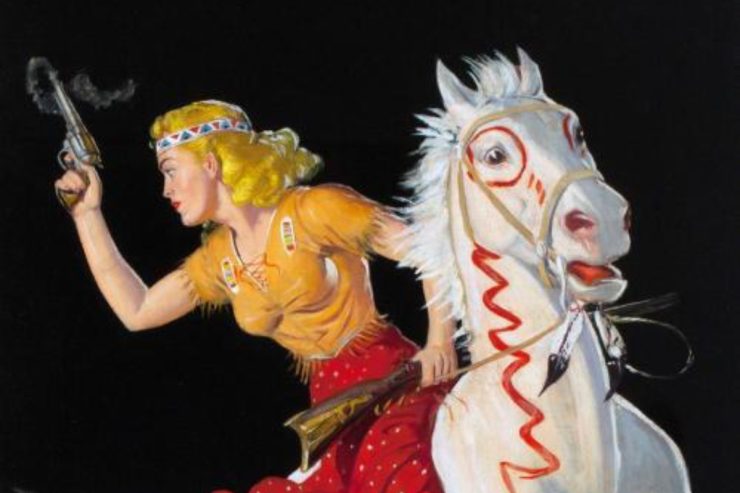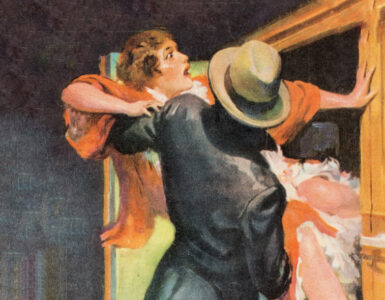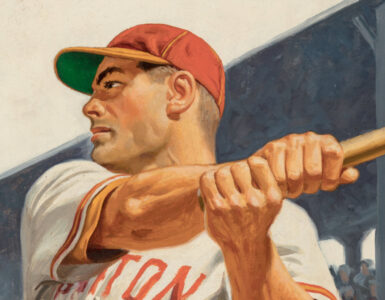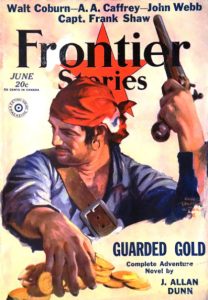 Bring on the fireworks! It’s time to celebrate our nation’s freedom. What better time for PulpFest to say thanks for all of the donations that we have received? They’re all for our members. The only requirement is to be at PulpFest 50 at the DoubleTree by Hilton Hotel Pittsburgh – Cranberry between August 4 and August 7.
Bring on the fireworks! It’s time to celebrate our nation’s freedom. What better time for PulpFest to say thanks for all of the donations that we have received? They’re all for our members. The only requirement is to be at PulpFest 50 at the DoubleTree by Hilton Hotel Pittsburgh – Cranberry between August 4 and August 7.
First of all, we’d like to thank Gordon Van Gelder and The Magazine of Fantasy & Science Fiction — 73-years-old in 2022 — has provided PulpFest with several cartons of back issues. These will be handed out by our registration staff while supplies last. The award-winning magazine has been supporting PulpFest — and Pulpcon before it — for decades! We’ve both been growing older, but better, for many, many years. We’re extremely grateful for the long-standing support of F&SF.
We have to offer a big thank you to Jerry Schneider of Pulpville Press for helping PulpFest 50 with its celebration of the centennial of pulp magazine and comic book publisher Fiction House. Jerry has donated a number of replicas of various Fiction House pulp magazines. We’ll be giving these out during our programming at PulpFest 50. We’re very grateful to Jerry and Pulpville Press for their generosity.
We’re also grateful to Munsey Award winner Matt Moring and Steeger Books for donating several books to not only help with our celebration of Fiction House but also the ninetieth anniversary of Popular Publications’ “Dime” line of pulp magazines. These will also serve as door prizes during our programming events at PulpFest 50. Also donating door prizes are Edgar Rice Burroughs, Inc., ERB Books, Meteor House, and Mike Chomko, Books.
Many thanks to Jess Terrell and the For the Love of All Things Edgar Rice Burroughs Facebook group for their continuing sponsorship of pulpfest.com. It’s a tremendous way to help us with our celebration of the pulp writers, editors, publishers, and artists who continue to inspire contemporary creators of the world’s popular culture. Also helping to sponsor pulpfest.com are Mike Chomko, Books and ThePulp.Net, your link to the online world of the pulp magazines since 1996!
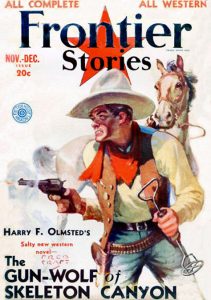 Our many sponsors over the years have helped PulpFest to reach its golden anniversary. We owe them all a big thank-you.
Our many sponsors over the years have helped PulpFest to reach its golden anniversary. We owe them all a big thank-you.
We’d also like to thank the Pittsburgh area bookstores and comic shops that have helped to promote “Summer’s Pulp Con” this year. Special thanks to Steve Ericson of Books from the Crypt, Ron Adams of Creepy Classics, Jeff Harper Productions, Martin Grams, and Todd McDevitt of New Dimension Comics for their help promoting PulpFest in 2022.
If you would like to register as a dealer at this year’s PulpFest, we’ve run out of tables. Please contact Jack Cullers ASAP to be added to our waiting list. You can reach him at jassways@woh.rr.com or jack@pulpfest.com.
If you are not from the Pittsburgh area and have yet to book your room for this year’s PulpFest, July 12 is the last day to receive the special convention rate. You can book your room directly through the PulpFest website. At the top of our webpage, you’ll find a link that reads “Book a Room.” Click on this link and you’ll be redirected to a secure site where you can book a room at the DoubleTree. You can also reserve a room by calling 1-800-222-8733. Please be sure to mention PulpFest to receive the special rate. Thanks so much to everyone who has reserved a room at our host hotel. By staying at the DoubleTree, you’ve helped to ensure the convention’s success.
And don’t forget that this year’s Confluence, Pittsburgh’s longest-running literary conference, will be held in person from July 29 – 31, 2022 at the Sheraton Pittsburgh Airport Hotel. That’s just one week before PulpFest 50. Why not spend the week between the two conferences visiting the beautiful and exciting city of Pittsburgh?
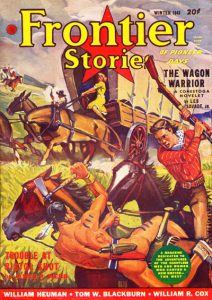 From the earliest times in America, the desire for “free land” has generated waves of westward migrations. At the urging of prominent individuals, labor unions, and organizations such as the Free-Soil Party, Congress passed the Homestead Act in 1862. Signed into law by President Abraham Lincoln, it proved to be “one of the most important pieces of legislation in the history of the American West, as hundreds of thousands of people moved to the Great Plains to take advantage of the free land.”
From the earliest times in America, the desire for “free land” has generated waves of westward migrations. At the urging of prominent individuals, labor unions, and organizations such as the Free-Soil Party, Congress passed the Homestead Act in 1862. Signed into law by President Abraham Lincoln, it proved to be “one of the most important pieces of legislation in the history of the American West, as hundreds of thousands of people moved to the Great Plains to take advantage of the free land.”
According to an essay written by pulp author John A. Saxon and published in 1945 by Writer’s Digest, the western story became a genre of its own during the second half of the 19th century. In 1869, writer Edward Zane Carroll Judson convinced hunter, scout, and showman William F. Cody to lend his name and reputation to a fictionalized account of his life, “Buffalo Bill, King of the Borderman,” originally serialized in Street & Smith’s New York Weekly. Phenomenally received, Judson found a public hungry for further adventures of the real-life hero of the American frontier. Thus started “. . . the fictionalized form of the western story . . . based partly on fact, but mostly on imagination.”
With the tremendous success of Street & Smith’s Western Story Magazine — introduced in 1919 — every pulp magazine publisher had to have at least one western title. Fiction House was no exception. Western fiction dominated its first pulp, Action Stories, throughout most of its 224-issue run. Lariat Story Magazine — introduced in 1925 — was an all-western pulp for all 187 of its issues.
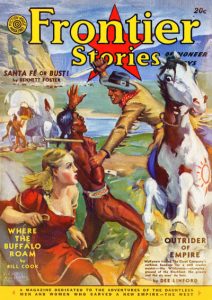 In 1929, Fiction House purchased Frontier Stories from Doubleday, Doran & Co. Between the first Fiction House issue — dated June 1929 — and its suspension following the September 1934 number, the magazine vacillated between general adventure stories and westerns. Around mid-1930, it became, by and large, a western pulp. Its covers reflected this change following the April 1930 number and its Canadian Mountie, painted by Gerard C. Delano. By mid-1932, the magazine displayed the slogan, “All Complete — All Western” above its title bar.
In 1929, Fiction House purchased Frontier Stories from Doubleday, Doran & Co. Between the first Fiction House issue — dated June 1929 — and its suspension following the September 1934 number, the magazine vacillated between general adventure stories and westerns. Around mid-1930, it became, by and large, a western pulp. Its covers reflected this change following the April 1930 number and its Canadian Mountie, painted by Gerard C. Delano. By mid-1932, the magazine displayed the slogan, “All Complete — All Western” above its title bar.
In late 1933 – 1934 Frontier Stories changed again. It began to run the slogan, “Wide World Adventures on the Danger Trail.” Once again, it featured a mix of general adventure stories and western fiction. Its readers’ columns were called, “World Adventurers” and “The Trading Post.” Following the September 1934 number, the magazine was suspended.
Soon after Fiction House revived Frontier Stories in mid-1937, every issue of the pulp magazine began to feature the blurb, “A Magazine Dedicated to the Adventures of the Dauntless Men and Women Who Carved a New Empire — The West.” Although the slogan disappeared in late 1946, the story type continued. As pulp scholar Ed Hulse has noted, it’s practically impossible to find a cover following the magazine’s revival that doesn’t “show buckskin-clad heroes trying to prevent war-painted redskins from scalping frightened blonde women.” It did, however, feature many entertaining stories by Tom Blackburn, William R. Cox, Dan Cushman — including his “Commanche John” stories — Bennett Foster, D. B. Newton, Les Savage, Jr., Gordon D. Shirreffs, Walker A. Tompkins, and others.
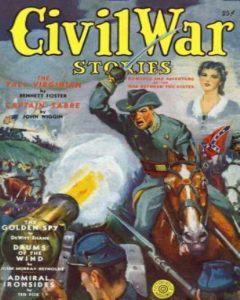 Fiction House’s Frontier Stories continued through its Winter 1953 number, ending with a total of 105 issues. Other Fiction House western pulps included Walt Coburn’s Action Novels — a one-shot that reprinted four of Coburn’s short novels — Two Western Books, Two Western Romances, Two Western-Action Books — featuring a mix of original and condensed books — and Tops in Western Stories. The latter reprinted stories from Lariat Story Magazine and Action Stories. In addition, the company also published Civil War Stories, a one-shot inspired by the success of the film Gone With the Wind. It was published in 1940.
Fiction House’s Frontier Stories continued through its Winter 1953 number, ending with a total of 105 issues. Other Fiction House western pulps included Walt Coburn’s Action Novels — a one-shot that reprinted four of Coburn’s short novels — Two Western Books, Two Western Romances, Two Western-Action Books — featuring a mix of original and condensed books — and Tops in Western Stories. The latter reprinted stories from Lariat Story Magazine and Action Stories. In addition, the company also published Civil War Stories, a one-shot inspired by the success of the film Gone With the Wind. It was published in 1940.
Allen Anderson painted the “Apache Flame” and her white horse, featured on the cover of the Summer 1950 number of Frontier Stories. Edgar F. Wittmack painted the cover for the first Fiction House issue of the magazine, dated June 1929. Fred Craft — best remembered for his Black Mask covers — contributed the cover art for the November/December 1932 number. Sidney Riesenberg painted the covers for both the Winter 1943 and Summer 1941 issues of Frontier Stories. He also painted the cover art for the Spring 1940 one-shot, Civil War Stories.
Derek Starr is a writer and popular culture enthusiast who has volunteered to help the PulpFest organizing committee. He is looking forward to writing more for our website and The Pulpster.

